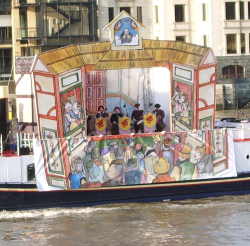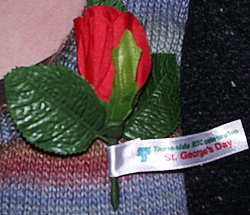 John’s Ruskin’s complaint at the desecration of the Derbyshire Dales featured in The Guardian on Saturday. ‘Every fool in Buxton can be at Bakewell in half-an-hour, and every fool in Bakewell at Buxton,’ Ruskin thundered. ‘Call me a fool,’ Matthew Fort wrote, ‘but I can see any number of good reasons to be in Bakewell…. How many towns the size of Bakewell, I wondered, could boast a Tiroler Stüberl, Austrian Coffee Shop & Sausage Importer?’ The answer, I suspect, lies in the large number of tourists who flock there – those same ‘Workmen and Labourers of Great Britain’ whom Ruskin addressed, perhaps, and their womenfolk? Continue reading “Every fool in Bakewell: Ruskin’s rant refuted”
John’s Ruskin’s complaint at the desecration of the Derbyshire Dales featured in The Guardian on Saturday. ‘Every fool in Buxton can be at Bakewell in half-an-hour, and every fool in Bakewell at Buxton,’ Ruskin thundered. ‘Call me a fool,’ Matthew Fort wrote, ‘but I can see any number of good reasons to be in Bakewell…. How many towns the size of Bakewell, I wondered, could boast a Tiroler Stüberl, Austrian Coffee Shop & Sausage Importer?’ The answer, I suspect, lies in the large number of tourists who flock there – those same ‘Workmen and Labourers of Great Britain’ whom Ruskin addressed, perhaps, and their womenfolk? Continue reading “Every fool in Bakewell: Ruskin’s rant refuted”
Every fool in Bakewell: Ruskin’s rant refuted
Ruskin (and food critic Matthew Fort) on the beauties of Derbyshire

 Literary Connections made the pilgrimage to Bankside on Shakespeare’s birthday on Wednesday and was rewarded by the sight of a miniature (and appropriately stagy) Elizabethan theatre sailing up the Thames in the evening sunlight, announced by the sound of trumpets (or were they sackbuts?) and drums. You can, I hope, see something of this in the photograph. It was hardly Cleopatra’s ‘burnish’d throne’ but impressive enough to entertain the crowd on the riverbank and sufficient to make us feel touched by a little of the Bard’s magic for the evening.
Literary Connections made the pilgrimage to Bankside on Shakespeare’s birthday on Wednesday and was rewarded by the sight of a miniature (and appropriately stagy) Elizabethan theatre sailing up the Thames in the evening sunlight, announced by the sound of trumpets (or were they sackbuts?) and drums. You can, I hope, see something of this in the photograph. It was hardly Cleopatra’s ‘burnish’d throne’ but impressive enough to entertain the crowd on the riverbank and sufficient to make us feel touched by a little of the Bard’s magic for the evening.  It is not only phonics that are synthetic these days – even the English rose is artificial. The one you can see here is an example. The English rose is not a reference to the daughter who is wearing it (delightful though she is, of course) but to the flower. Driving through Mottram in Longdendale on Saturday (19 April, so it was not even St George’s Day), we were greeting with the surreal sight of a man dressed as St George (that is, the St George of Daily Express mastheads and comic books) handing out red roses to drivers waiting at the traffic lights.
It is not only phonics that are synthetic these days – even the English rose is artificial. The one you can see here is an example. The English rose is not a reference to the daughter who is wearing it (delightful though she is, of course) but to the flower. Driving through Mottram in Longdendale on Saturday (19 April, so it was not even St George’s Day), we were greeting with the surreal sight of a man dressed as St George (that is, the St George of Daily Express mastheads and comic books) handing out red roses to drivers waiting at the traffic lights.